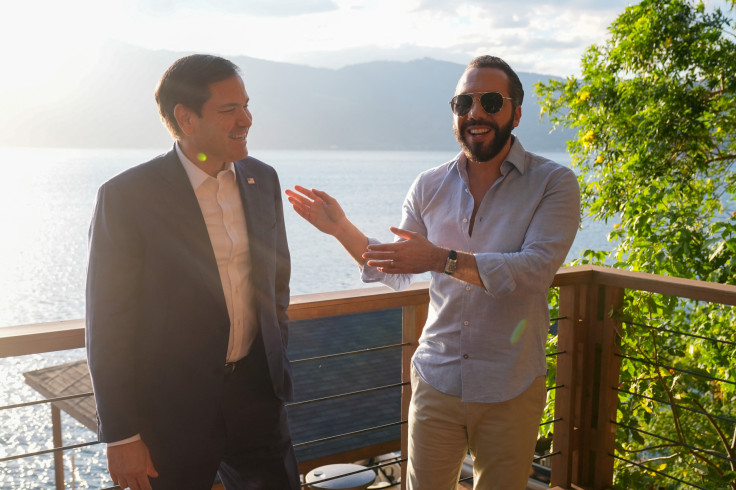
El Salvador President Nayib Bukele offered to hold U.S. criminals and deportees in its so-called "mega prison" system, an offer that Secretary of State Marco Rubio and President Donald Trump are reportedly considering. However, if such a plan materializes, it could be met with a plethora of legal challenges.
"We have offered the United States of America the opportunity to outsource part of its prison system," Bukele wrote on X, saying his government was willing to take in convicted criminals, including U.S. citizens, for a fee. "The fee would be relatively low for the U.S. but significant for us, making our entire prison system sustainable."
Rubio, who stopped in El Salvador while visiting Central America this week, seemed to be considering the offer, calling it an "extraordinary" gesture.
"In an act of extraordinary friendship to our country... [El Salvador] has agreed to the most unprecedented and extraordinary migratory agreement anywhere in the world," Rubio told reporters Monday.
We have offered the United States of America the opportunity to outsource part of its prison system.
— Nayib Bukele (@nayibbukele) February 4, 2025
We are willing to take in only convicted criminals (including convicted U.S. citizens) into our mega-prison (CECOT) in exchange for a fee.
The fee would be relatively low for… pic.twitter.com/HTNwtp35Aq
However, experts say it's unlikely that such a plan would come into fruition, facing legal challenges, particularly as it relates to U.S. citizens.
"The announcement is a P.R. win," Gustavo Flores-Macias, a professor of government and public policy at Cornell University who specializes in Latin America, told The New York Times. It allows Bukele to show he is all-in for Trump, and bolsters the Trump administration, "which is looking to dissuade undocumented migration by raising the stakes if apprehended."
U.S. law states that an offender can only be sent to a country whether they're a citizen— and that's only with their consent and for certain offenses that apply in both countries, NBC News reports.
"Housing citizens and residents in a prison located in a foreign state would raise constitutional concerns, especially regarding cruel and unusual punishment," said John Fishwick, a former U.S. attorney in Virginia. "Would El Salvador be considered an agent of the United States? What court would have jurisdiction over prisoner disputes?"
There's also the question of human rights violations, which have plagued Bukele's prison system as he has tried to overhaul gang violence and crime throughout his time in office. In 2022, Bukele declared a state of emergency in El Salvador, arresting tens of thousands of people around the country.
Since then, homicides have sharply decreased, and extortion payments that gangs demanded from businesses and residents also declined. Still, his tactics have raised eyebrows from civil rights activists from all over the world, thanks to mass arbitrary arrests, extreme overcrowding at prisons, reports of torture and at least 261 prison deaths between 2022 and 2024, The New York Times reports.
Analysts also argue that such a move is likely to be challenged, even if the Trump administration ultimately takes Bukele up on his offer.
"It is a bizarre and unprecedented proposal being made potentially between two authoritarian, populist, right wing leaders seeking a transactional relationship," Mneesha Gellman, an international politics professor at Emerson College told CNN. "It's not rooted in any sort of legal provision and likely violates a number of international laws relating to the rights of migrants."
This isn't the first time Bukele tries to cozy up with the Trump administration. Back in 2019, El Salvador signed an agreement with the U.S. to receive non-Salvadoran migrants who had been detained in the United States. That deal was never implemented because of the COVID-19 pandemic and was eventually terminated by the Biden administration.
© 2025 Latin Times. All rights reserved. Do not reproduce without permission.




